直接引语和间接引语讲解及练习
- 格式:doc
- 大小:72.00 KB
- 文档页数:8
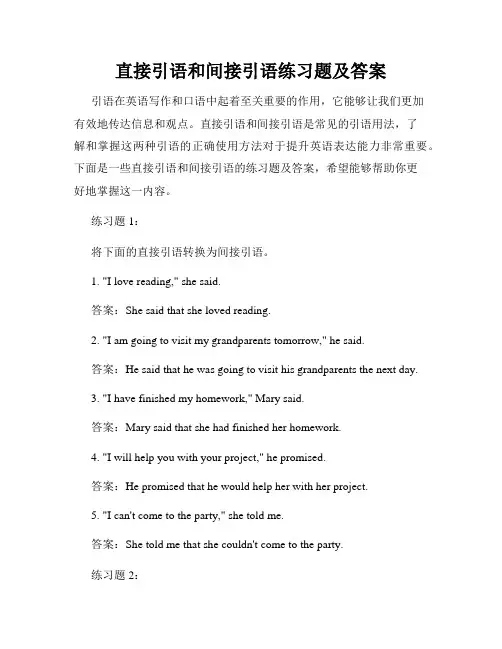
直接引语和间接引语练习题及答案引语在英语写作和口语中起着至关重要的作用,它能够让我们更加有效地传达信息和观点。
直接引语和间接引语是常见的引语用法,了解和掌握这两种引语的正确使用方法对于提升英语表达能力非常重要。
下面是一些直接引语和间接引语的练习题及答案,希望能够帮助你更好地掌握这一内容。
练习题1:将下面的直接引语转换为间接引语。
1. "I love reading," she said.答案:She said that she loved reading.2. "I am going to visit my grandparents tomorrow," he said.答案:He said that he was going to visit his grandparents the next day.3. "I have finished my homework," Mary said.答案:Mary said that she had finished her homework.4. "I will help you with your project," he promised.答案:He promised that he would help her with her project.5. "I can't come to the party," she told me.答案:She told me that she couldn't come to the party.练习题2:将下面的间接引语转换为直接引语。
1. He told me that he was going to buy a new car.答案:He said, "I am going to buy a new car."2. She said that she had finished her presentation.答案:She said, "I have finished my presentation."3. They promised that they would help us with the event.答案:They promised, "We will help you with the event."4. I asked her if she wanted to go to the movies.答案:I asked her, "Do you want to go to the movies?" 5. He told me he couldn't come to the party.答案:He said, "I can't come to the party."练习题3:将下面的直接引语改写成间接引语。
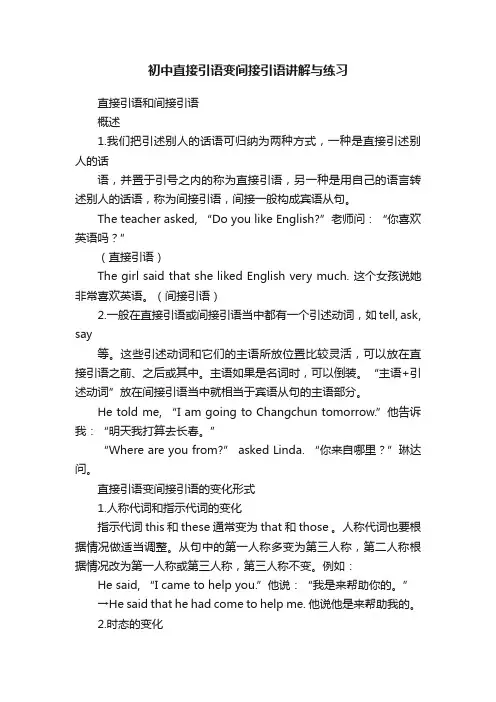
初中直接引语变间接引语讲解与练习直接引语和间接引语概述1.我们把引述别人的话语可归纳为两种方式,一种是直接引述别人的话语,并置于引号之内的称为直接引语,另一种是用自己的语言转述别人的话语,称为间接引语,间接一般构成宾语从句。
The teacher asked, “Do you like English?”老师问:“你喜欢英语吗?”(直接引语)The girl said that she liked English very much. 这个女孩说她非常喜欢英语。
(间接引语)2.一般在直接引语或间接引语当中都有一个引述动词,如tell, ask, say等。
这些引述动词和它们的主语所放位置比较灵活,可以放在直接引语之前、之后或其中。
主语如果是名词时,可以倒装。
“主语+引述动词”放在间接引语当中就相当于宾语从句的主语部分。
He told me, “I am going to Changchun tomorrow.”他告诉我:“明天我打算去长春。
”“Where are you from?” asked Linda. “你来自哪里?”琳达问。
直接引语变间接引语的变化形式1.人称代词和指示代词的变化指示代词this 和these通常变为that和those 。
人称代词也要根据情况做适当调整。
从句中的第一人称多变为第三人称,第二人称根据情况改为第一人称或第三人称,第三人称不变。
例如:He said, “I came to help you.”他说:“我是来帮助你的。
”→He said that he had come to help me.他说他是来帮助我的。
2.时态的变化(1)引述动词如果用一般现在时或一般将来时,间接引语的时态不变。
(2)引述动词如果用一般过去时,间接引语的时态要变成相应的过去时态的一种。
具体变化如下:一般现在时→一般过去时一般过去时→过去完成时现在进行时→过去进行时现在完成时→过去完成时一般将来时→过去将来时(1)含有情态动词的直接引语变成间接引语是,情态动词也要相应地变成过去时态。

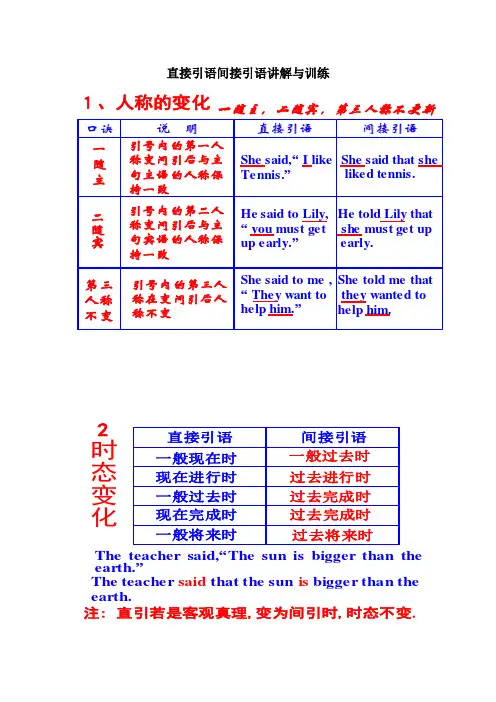
直接引语间接引语讲解与训练 1、人称的变化间接引语直接引语说明口诀一随主二随宾第三人称不变引号内的第一人称变间引后与主句主语的人称保持一致引号内的第二人称变间引后与主句宾语的人称保持一致引号内的第三人称在变间引后人称不变She said,“I like Tennis.”She said that she liked tennis.He said to Lily,“you must get up early.”He told Lily that she must get up early.She said to me ,“They w ant to help him.”She told me that they w anted to help him.一随主,二随宾,第三人称不更新直接引语间接引语一般现在时一般过去时现在进行时过去进行时一般过去时过去完成时现在完成时过去完成时一般将来时过去将来时The teacher said,“The sun is bigger than the earth.”The teacher said that the sun is bigger than the earth.注: 直引若是客观真理,变为间引时,时态不变.时态变化2直接引语间接引语指示代词时间状语地点状语方向性动词this,that,these those now,then,today that day this week that week yesterday the day beforelast week the week before four days ago four days before the day beforeyesterdaytwo days before tomorrowthe next/followingdaynext month the next/followingmonthhere therecome,go,bring take情态动词can, may, must could,might,had to总结1 直接引语是疑问句,变间接引语时,要从疑问语序变为陈述语序。
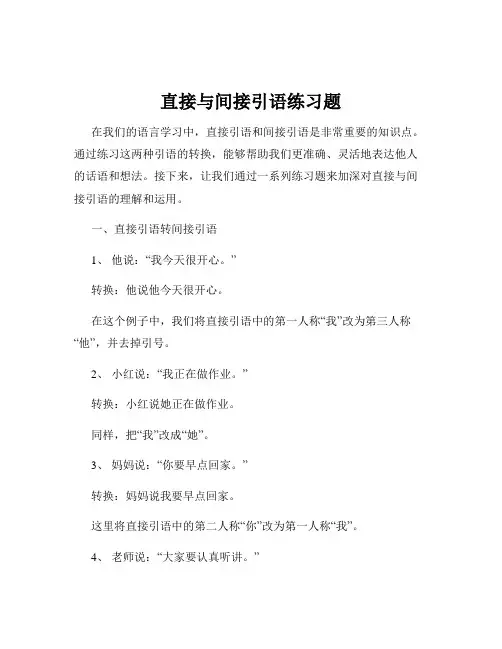
直接与间接引语练习题在我们的语言学习中,直接引语和间接引语是非常重要的知识点。
通过练习这两种引语的转换,能够帮助我们更准确、灵活地表达他人的话语和想法。
接下来,让我们通过一系列练习题来加深对直接与间接引语的理解和运用。
一、直接引语转间接引语1、他说:“我今天很开心。
”转换:他说他今天很开心。
在这个例子中,我们将直接引语中的第一人称“我”改为第三人称“他”,并去掉引号。
2、小红说:“我正在做作业。
”转换:小红说她正在做作业。
同样,把“我”改成“她”。
3、妈妈说:“你要早点回家。
”转换:妈妈说我要早点回家。
这里将直接引语中的第二人称“你”改为第一人称“我”。
4、老师说:“大家要认真听讲。
”转换:老师说大家要认真听讲。
当直接引语中的对象是“大家”时,在间接引语中保持不变。
5、小明说:“我的书包在桌子上。
”转换:小明说他的书包在桌子上。
注意人称和指示代词的变化。
二、间接引语转直接引语1、他告诉我他明天会来。
转换:他说:“我明天会来。
”2、她跟我说她喜欢唱歌。
转换:她说:“我喜欢唱歌。
”3、妈妈说我应该多吃水果。
转换:妈妈说:“你应该多吃水果。
”将间接引语中的人称和指示代词改回原来的形式,并加上引号。
三、复杂情况的转换1、他说:“我昨天去了北京,那里很美。
”转换:他说他昨天去了北京,那里很美。
2、小红说:“我明天打算去看电影,如果不下雨的话。
”转换:小红说她明天打算去看电影,如果不下雨的话。
3、老师说:“你们要努力学习,因为考试快到了。
”转换:老师说我们要努力学习,因为考试快到了。
在这些复杂的句子中,我们依然遵循人称和指示代词的变化原则。
四、时态的变化1、他说:“我现在正在吃饭。
”转换:他说他那时正在吃饭。
直接引语是现在进行时,在间接引语中要变成过去进行时。
2、她说:“我昨天买了一本书。
”转换:她说她昨天买了一本书。
一般过去时在直接引语和间接引语中保持不变。
3、小明说:“我明天要去旅行。
”转换:小明说他第二天要去旅行。
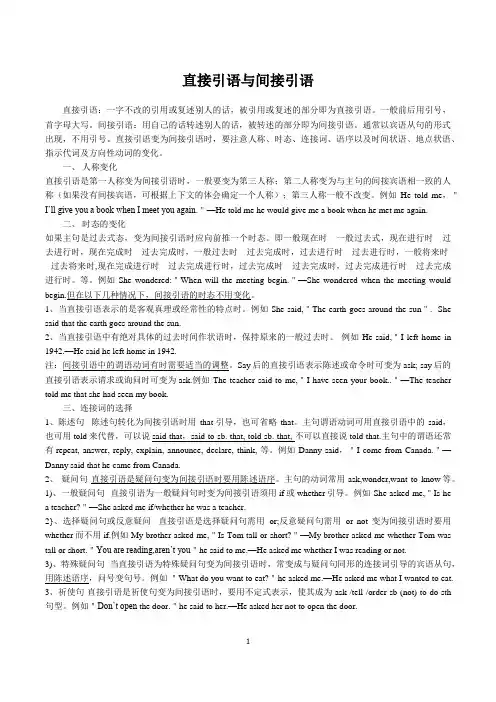
直接引语与间接引语直接引语:一字不改的引用或复述别人的话,被引用或复述的部分即为直接引语。
一般前后用引号,首字母大写。
间接引语:用自己的话转述别人的话,被转述的部分即为间接引语。
通常以宾语从句的形式出现,不用引号。
直接引语变为间接引语时,要注意人称、时态、连接词、语序以及时间状语、地点状语、指示代词及方向性动词的变化。
一、人称变化直接引语是第一人称变为间接引语时,一般要变为第三人称;第二人称变为与主句的间接宾语相一致的人称(如果没有间接宾语,可根据上下文的体会确定一个人称);第三人称一般不改变。
例如He told me,"I’ll give you a book when I meet you again."—He told me he would give me a book when he met me again.二、时态的变化如果主句是过去式态,变为间接引语时应向前推一个时态。
即一般现在时---一般过去式,现在进行时---过去进行时,现在完成时---过去完成时,一般过去时---过去完成时,过去进行时---过去进行时,一般将来时---过去将来时,现在完成进行时---过去完成进行时,过去完成时---过去完成时,过去完成进行时---过去完成进行时。
等。
例如She wondered:"When will the meeting begin."—She wondered when the meeting would begin.但在以下几种情况下,间接引语的时态不用变化。
1、当直接引语表示的是客观真理或经常性的特点时。
例如 She said,"The earth goes around the sun".--She said that the earth goes around the sun.2、当直接引语中有绝对具体的过去时间作状语时,保持原来的一般过去时。
例如 He said,"I left home in 1942.—He said he left home in 1942.注:间接引语中的谓语动词有时需要适当的调整。
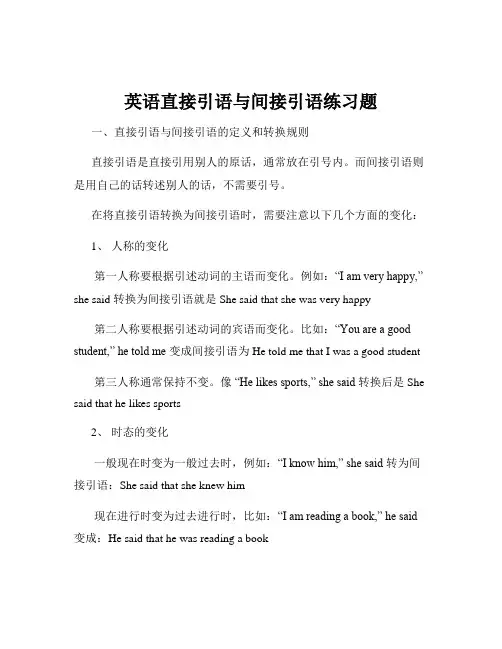
英语直接引语与间接引语练习题一、直接引语与间接引语的定义和转换规则直接引语是直接引用别人的原话,通常放在引号内。
而间接引语则是用自己的话转述别人的话,不需要引号。
在将直接引语转换为间接引语时,需要注意以下几个方面的变化:1、人称的变化第一人称要根据引述动词的主语而变化。
例如:“I am very happy,” she said 转换为间接引语就是 She said that she was very happy 第二人称要根据引述动词的宾语而变化。
比如:“You are a good student,” he told me 变成间接引语为 He told me that I was a good student 第三人称通常保持不变。
像“He likes sports,” she said 转换后是 She said that he likes sports2、时态的变化一般现在时变为一般过去时,例如:“I know him,” she said 转为间接引语:She said that she knew him现在进行时变为过去进行时,比如:“I am reading a book,” he said 变成:He said that he was reading a book现在完成时变为过去完成时,像“I have finished my homework,” she said 转换为:She said that she had finished her homework一般过去时变为过去完成时,例如:“I went to Beijing last year,” he said 转为:He said that he had gone to Beijing the year before 一般将来时变为过去将来时,比如:“I will come tomorrow,” she said 变成:She said that she would come the next day3、时间状语和地点状语的变化now 变为 then,today 变为 that day,yesterday 变为 the day before,tomorrow 变为 the next day,last week 变为 the week before 等等。
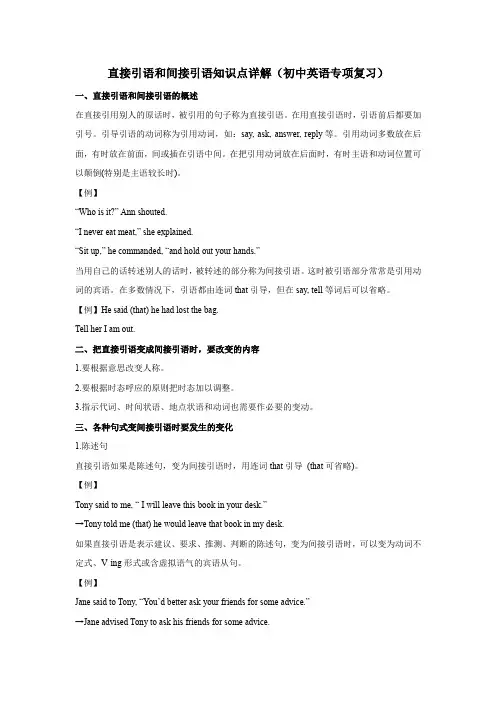
直接引语和间接引语知识点详解(初中英语专项复习)一、直接引语和间接引语的概述在直接引用别人的原话时,被引用的句子称为直接引语。
在用直接引语时,引语前后都要加引号。
引导引语的动词称为引用动词,如:say, ask, answer, reply等。
引用动词多数放在后面,有时放在前面,间或插在引语中间。
在把引用动词放在后面时,有时主语和动词位置可以颠倒(特别是主语较长时)。
【例】“Who is it?” Ann shouted.“I never eat meat,” she explained.“Sit up,” he commanded, “and hold out your hands.”当用自己的话转述别人的话时,被转述的部分称为间接引语。
这时被引语部分常常是引用动词的宾语。
在多数情况下,引语都由连词that引导,但在say, tell等词后可以省略。
【例】He said (that) he had lost the bag.Tell her I am out.二、把直接引语变成间接引语时,要改变的内容1.要根据意思改变人称。
2.要根据时态呼应的原则把时态加以调整。
3.指示代词、时间状语、地点状语和动词也需要作必要的变动。
三、各种句式变间接引语时要发生的变化1.陈述句直接引语如果是陈述句,变为间接引语时,用连词that引导(that可省略)。
【例】Tony said to me, “ I will leave this book in your desk.”→Tony told me (that) he would leave that book in my desk.如果直接引语是表示建议、要求、推测、判断的陈述句,变为间接引语时,可以变为动词不定式、V-ing形式或含虚拟语气的宾语从句。
【例】Jane said to Tony, “You’d better ask your friends for some advice.”→Jane advised Tony to ask his friends for some advice.→Jane suggested Tony asking his friends for some advice.→Jane advised/suggested that Tony (should) ask his friends for some advice.2.一般疑问句、选择疑问句和反意疑问句直接引语是一般疑问句,变为间接引语时,要用连词whether或if引导,同时把原来的疑问句语序变为陈述句语序。
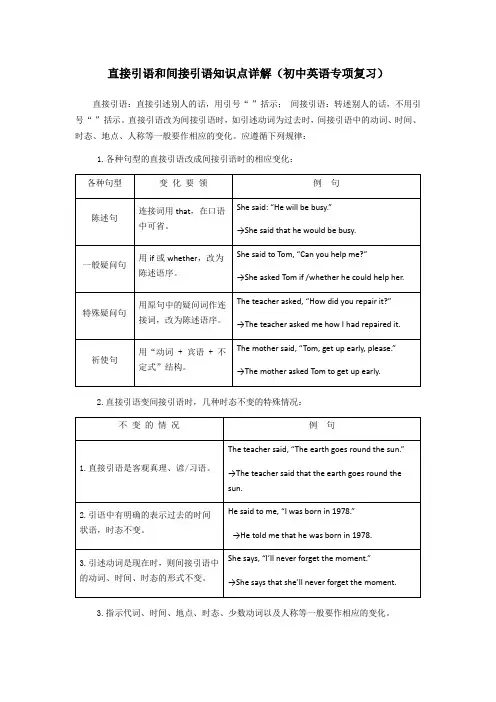
直接引语和间接引语知识点详解(初中英语专项复习)
直接引语:直接引述别人的话,用引号“”括示;间接引语:转述别人的话,不用引号“ ”括示。
直接引语改为间接引语时,如引述动词为过去时,间接引语中的动词、时间、时态、地点、人称等一般要作相应的变化。
应遵循下列规律:
1.各种句型的直接引语改成间接引语时的相应变化:
2.直接引语变间接引语时,几种时态不变的特殊情况:
3.指示代词、时间、地点、时态、少数动词以及人称等一般要作相应的变化。
二重点难点必记(一)使用宾语从句应注意的几个问题。
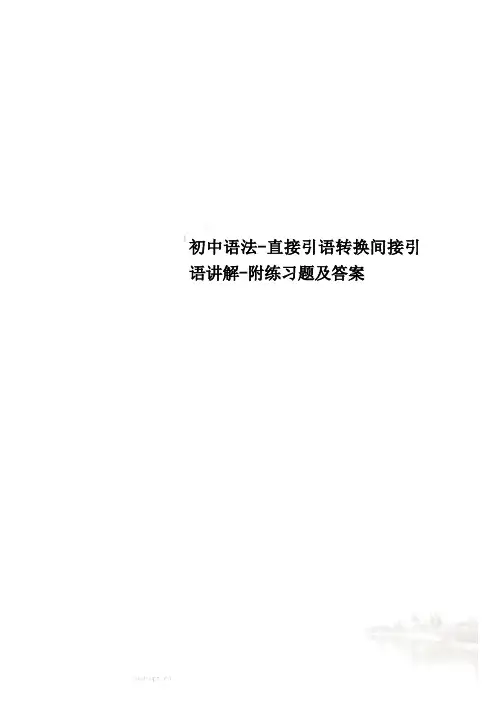
初中语法-直接引语转换间接引语讲解-附练习题及答案直接引语与间接引语直接引语:一字不改的引用或复述别人的话,被引用或复述的部分即为直接引语。
一般前后用引号,首字母大写。
间接引语:用自己的话转述别人的话,被转述的部分即为间接引语。
通常以宾语从句的形式出现,不用引号。
直接引语变为间接引语时,要注意人称、时态、连接词、语序以及时间状语、地点状语、指示代词及方向性动词的变化。
一、人称变化直接引语是第一人称变为间接引语时,一般要变为第三人称;第二人称变为与主句的间接宾语相一致的人称(如果没有间接宾语,可根据上下文的体会确定一个人称);第三人称一般不改变。
例如He told me,"I’ll give you a book when I meet you again."—He told me he would give me a book when he met me again.二、时态的变化如果主句是过去式态,变为间接引语时应向前推一个时态。
即一般现在时---一般过去式,现在进行时---过去进行时,现在完成时---过去完成时,一般过去时---过去完成时,过去进行时---过去进行时,一般将来时---过去将来时,现在完成进行时---过去完成进行时,过去完成时---过去完成时,过去完成进行时---过去完成进行时。
等。
例如She wondered:"When will the meeting begin."—She wondered when the meeting would begin.但在以下几种情况下,间接引语的时态不用变化。
1、当直接引语表示的是客观真理或经常性的特点时。
例如She said,"The earth goes around the sun".--She said that the earth goes around the sun.2、当直接引语中有绝对具体的过去时间作状语时,保持原来的一般过去时。
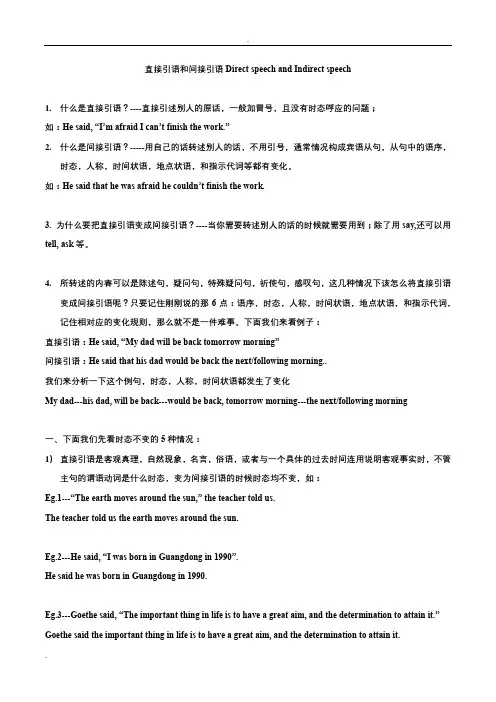
直接引语和间接引语Direct speech and Indirect speech1.什么是直接引语?----直接引述别人的原话,一般加冒号,且没有时态呼应的问题;如:He said, “I’m afraid I can’t finish the work.”2.什么是间接引语?-----用自己的话转述别人的话,不用引号,通常情况构成宾语从句,从句中的语序,时态,人称,时间状语,地点状语,和指示代词等都有变化。
如:He said that he was afraid he couldn’t finish the work.3. 为什么要把直接引语变成间接引语?----当你需要转述别人的话的时候就需要用到;除了用say,还可以用tell, ask等。
4.所转述的内容可以是陈述句,疑问句,特殊疑问句,祈使句,感叹句,这几种情况下该怎么将直接引语变成间接引语呢?只要记住刚刚说的那6点:语序,时态,人称,时间状语,地点状语,和指示代词,记住相对应的变化规则,那么就不是一件难事。
下面我们来看例子:直接引语:He said, “My dad will be back tomorrow morning”间接引语:He said that his dad would be back the next/following morning..我们来分析一下这个例句,时态,人称,时间状语都发生了变化My dad---his dad, will be back---would be back, tomorrow morning---the next/following morning一、下面我们先看时态不变的5种情况:1)直接引语是客观真理,自然现象,名言,俗语,或者与一个具体的过去时间连用说明客观事实时,不管主句的谓语动词是什么时态,变为间接引语的时候时态均不变,如:Eg.1---“The earth moves around the sun,” the teacher told us.The teacher told us the earth moves around the sun.Eg.2---He said, “I was born in Guangdong in 1990”.He said he was born in Guangdong in 1990.Eg.3---Goethe said, “The important thing in life is to have a great aim, and the determination to attain it.”Goethe said the important thing in life is to have a great aim, and the determination to attain it.Eg.4:He said, “Practice makes perfect.”He said that practice makes perfect.2)主句的谓语动词是现在是或将来时,变成间接引语时时态不变Eg.1---He says, “I finished the work.”He says he finished the work.Eg.2---He will say, “I have watered the flower.”He will say he has watered the flower.Eg.3---He will say, “I will try my best to help you.”He will say he will try his best to help me.3)直接引语如果是一般现在时,表示反复出现或习惯性动作,变为间接引语时时态不变。
直接引语和间接引语Direct Speech and Indirect Speech直接引述别人的原话,叫直接引语。
用自己的话转述别人的话,叫间接引语。
间接引语在多数情况下构成宾语从句。
直接引语一般前后要加引号;间接引语不用引号。
例如:直接引语:Mr. Black said, “I’m busy.”间接引语:Mr. Black said that he was busy.1.陈述句直接引语如果是陈述句,变为间接引语时,用连词that引导(that在口语中常省略),从句中的人称、时态、指示代词、时间状语、地点状语等要作相应的变化。
(1)人称的变化• He said, “I like it very much.”→ He said that he liked it very much.• He said, “I’ve left my book in your room.”→ He told me that he had left his book in my room.(2)时态的变化如主句的谓语动词是一般过去时,直接引语变间接引语时,从句的谓语动词在时态方面要作以下的变化:• He said, “I saw the film yesterday.”→ He said that he had seen the film the day• She said, “I have seen the film. It is good. ”→ She said that she had seen the film.直接引语如果是客观真理,变为间接引语时,时态不变。
例如:• He said, “Light travels much faster than sound.”→ He said that light travels much faster than sound.(3)指示代词、时间状语和地点状语的变化• She said, “I will come this evening.”→ She said that she would go that evening.• He said, “My sister was here three days ago, but she is not here now.”→ He said that his sister had been there three days before but she was not here then.现将这几种变化列表如下:以上这些变化,要根据说话的实际情况来定。
直接引语与间接引语一、.直接引语是指原封不动的引用原话,把它放在引号内,例如:Mother told me, “You should finish your homework 。
”They said, “We want to have a rest.”间接引语即用自己的话加以转述,被转述的话不放在引号内。
上面两个例句变成间接引语应该是:Mother told me that I should finish my homework. They said they wanted to have a rest.二、.当我们把直接引语变成间接引语时,由于引述动词(said,told等)一般都是过去时形式,因此间接引语中的动词时态、人称代词、限定词、时间状语、地点状语等一般都要做相应的变化。
有下面几种情况:1)主句谓语动词为过去时,间接引语中的动词叶变为过去的某种时态。
即:一般现在时->一般过去时现在进行时->过去进行时一般将来时->过去将来时现在完成时->过去完成时一般过去时->过去完成时过去完成时->过去完成时例如:She said, “I am hungry.”-> She said (that) she was hungry.He said, “The family are fighting among themselves.”He said (that) the family were fighting among themselves.They said, “We’re going to Hawaii this summer vacation.”-> They said they were going to Hawaii that summer vacation.She said, “The milk will go off(变质)if you don’t drink it today.”-> She said the milk would go off if I didn’t drink it that day.特殊情况当引述的是客观事实、科学真理、现在习惯工作以及格言等内容时:The teacher said to us, “The earth travels around the sun.” -> The teacher told us the earth moves around the sun.2)人称代词、限定词、时间状语、地点状语的变化人称代词,除引述本人原话外,通常第一、二人称变为第三人称,或者第二人称变为第一人称;限定词也作相应的变化。
直接引语和间接引语直接引述别人的原话,叫做直接引语;用自己话转述别人的话,叫做间接引语。
间接引语一般构成宾语从句。
直接引语必须放在引号内,间接引语则不用引号。
直接引语改为间接引语时,除将引语部分变成宾语从句外,还必须对直接引语中的人称、时态、指示代词、时间状语、地点状语等进行改变。
直接引语转成间接引语的时态变化:1、当主句谓语动词是一般现在时态或一般将来时态宾语从句的谓语动词的时态不作任何变化。
如:He said, ”We help each other. ” = He said that they help each other.She said, ” I have bought a dictionary. ” = She said that she had bought a dictionar y.She said, ” He will go to the hospital. ” = She said that he would go to the hospital.注意:主句谓语动词是一般过去时态动词表示客观真理仍用一般现在时态,不必变为过去时态。
如:The teacher said, “Light travels much faster than sound.”= The teacher said light travels much faster than sound.2.在人称方面存在人称的变化,变化规律常常是:(1)直接引语中的第一人称常跟主句的主语一致。
e.g.He said,“I have finished my homework.”→He said(that)he had finished his homework.(2)直接引语中的第二人称常常依主句中位于动词后面的谈话对象而定,若后面没有谈话对象,则常变为第一人称。
e.g.Tom said,“You must finish your homework today.”→Tom said I had to finish my homework that day.(3)直接引语中的第三人称变为间接引语时, 常不变。
八下英语专题_直接引语和间接引语讲解及练习直接引语和间接引语讲解及练习直接引述别人的原话,叫直接引语。
用自己的话转述别人的话,叫间接引语。
例:.“What’s you name?” she asked.He replied that he was going by train.(一)将直接引语变为间接引语时要做一些相应的变化,主要有以下几种情况。
1 人称的变化(一随主、二随宾、三不变)直接引语变间接引语相当于把直接引语变为宾语从句。
因此直接引语的人称要做相应变化。
①一随主直接引语的主语为第一人称时,变为间接引语要和主句的主语保持一致。
He said: “I will go to Beijing tomorrow.”He said that he would go to Beijing the next day.②二随宾直接引语的主语为第二人称时,要和主句的宾语保持一致。
例:He said to me: “You will leave tomorrow.”He told me that I would leave the next day.③三不变直接引语是第三人称为主语时,变间接引语时不变。
例:He said to me: “My sister will leave tomorrow.”He told me that his sister would leave tomorrow.He said to us: “They want to come.”He told us that they wanted to go.2.时态的变化①如果主句是过去式时,从句做相对应变化. 如下一般现在时→一般过去时(谓语变化:)一般将来时→过去将来时(谓语变化:)现在进行时→过去进行时(谓语变化:)一般过去时→过去完成时(谓语变化:)现在完成时→过去完成时(谓语变化:)情态动词的变化()*直接引语如果是客观真理,变间接引语时,时态用一般现在时。
Unit1 语法核心冲破: 直接引语变间接引语这两种引语都是宾语从句,可是直接引语放在引号内,不用连词联接;间接引语不用引号,通经常使用连接词与主句联接一、直接引语变间接引语时句式的转变1.例:He said, “I'm very glad.”→ He said he was very glad.2.例:He said, “Can you come this afternoon, John?”→He asked John could come that afternoon.3.例: He said, “Where is Mr. Wang?”→He asked where Mr. Wang was.Tom says to me, “what food do you like best”.→Tom asks me food I like best4.Our parents told us“Learn English well!”咱们的父母告知咱们:“把英语学好啊!”Our parents told us English well. 咱们的父母告知我吗要把英语学好。
The teacher said to me, “Don’t read that novel!”The teacher asked/ told me that novel.Our parents told us, “ Never do wrong!” 父母告知咱们:“不要做错事!”Our parents told us never to do wrong. 咱们的父母告知咱们不要做错事。
二、人称的转变例如:“I went to the Great Wall yesterday,” Li Hua said.→Li Hua said that he had gone to the Great Wall the day before.“I’ll come to help you whenever you need my help,” he answered her.→He answered her that he would come to help her whenever she needed his help.She said to me,“Your pronunciation is better than his.”→She told me that my pronunciation was better than his.三、时态转变四、指示代词、时刻状语、地址状语和动词的转变【拓展延伸】直接引语变成间接引语不时态不作改变的情形He says, “I’m tired.”→He says that he is tired.He will say, “The boy was lazy.”→He will tell you that the boy was lazy.Our geography teacher said to us, “The earth goes round the sun.”→Our geography teacher told us that the earth goes round the sun.She said, “I was born in 1995.”→ She said that she was born in 1995.【典型例题】(1)Can you tell me_______?A. what the matter isB. what matter it isC. what’s the matterD. the matter is what(2)The physics teacher said the earth ____around the sun.A. is movingB. movedC. had movedD. moves 【语法专练】1. Mother asked the youngest kid____with his car.A. what the matterB. What was the matterC. what the matter isD. what is the matter2. The tourist asked the guide what he____visit the next day.A. was going toB. willC. is going inD. is to3. The teacher told us that light____ faster than sound.A. traveledB. had traveledC. is traveling4. Tom hanks told his teacher that he____born in 1968.A. wasB. had beenC. isD. has been5. Linda asked Amy_____ she could tell her the general ideas of the poem.A. thatB. whetherC. whatD. how6. My brother said to me, “I’m going to have a holiday next week.”My brother ____ _________ __________ _________going to have a holiday the next week.7. Mother said to me, “What are you doing in the room?”Mother asked me________ ________ __________ _________ in the room.asked, “ Can I borrow your bike?”He asked _______ ________ ________ borrow my bikesaid to me, “ Do you like football?”Tom asked me _______ _________ _________footballsaid to me, “ I went over my lessons last night.”She told me _________ _________ __________over her lessons the night before.附:Unit I 短语归纳1. 做个好朋友to be a good friend2. 做以下调查make the following survey3. 合计总分add up the score4. 得分get points5. 心烦意乱地来到学校come to school upset6. 不睬睬铃声ignore the bell7. 使你那个德国朋友安静下来calm down your German friend8. 关切你朋友be concerned about your friend(s)9. 松开了get loose10. 不能不去户外遛狗have got to walk the dog outdoors11. 帮他期末考试作弊help him cheat in the end-of-term exam12. 列出理由make a list of reasons / list the reasons13. 记下连续串的请求set down a series of requests14. 依照问卷调查according to the questionnaire15. 依照编辑的忠告according to the editor’s advice16. 为了分担你的困难in order to share your difficulties / troubles17. 与老板相爱fall in love with the boss18. 与我的同桌相处融洽get along / on well with my deskmate19. 关切青青年be concerned about teenagers20. 为了和老板面对面地交流in order to communicate with the boss face to face21. 信任政府trust / believe in the government22. 经历了太多的战争go through too many wars23. 相邻的城镇neighboring towns24. 相邻的国家neighboring countries直接引语变间接引语练习题一、将所给直接引语变成间接引语,每空一词:1. “I never eat meat.” he said.He said that ______ never ______ meat.2. “I’ve found my wallet.” he said to me.He ______ me that he ______ ______ ______ wallet.3. “I took it home with me.” she said.She said that ______ ______ _______ it home with her.4. The teacher said, “The sun rises in the east and goes down in the west.”The teacher said that the sun ______ in the east and ______ down in the west.5. “I met her yesterday.” he said to me.He ______ me that he ______ met the day ______.6. “You must come here before five.” he said.He said that I ______ to go ______ before five.7. “I bought the house 10 years ago.” he said.He said that he _______ bought the house 10 years _______.8. “Did you see her last week?” he said.He ______ ______ I had seen her the week _______.9. He said, “You can sit here, Jim.”He ______ Jim that he ______ sit there.10. He asked, “How did you find it, mother?”He asked her mother ______ ______ ______ found it.11. “Where have you been these days?” he asked.He asked me _______ _______ _______been _______ days.12. “Do you know where she lives?” he asked.He asked ______ ______ knew where she ______.13. “Stop making so much noise, children.” he said.He ______ the children ______ ______ making so much noise.14. “Don’t tell him the news.” she said.She told me _______ ______ ______ him the news.15. “I am having supper,” he said.He said that _______ _______ having supper.16. “I’ve seen the film,” Gina said to me.Gina _______ me that she _______ _______ the film.17. “I went home with my sister,” she said.She said that _______ _______ _______ home with her sister.18. “Keep quiet, children.” he said.He _______ the children _______ _______ quiet.20. “Don’t look out of the window,” she said.She told me _______ _______ _______ out of the window.家庭作业1. “I am having supper,” he said.He said that _______ _______ having supper.2. “I’ve seen the film,” Gina said to me.Gina _______ me that she _______ _______ the film.3. “I went home with my sister,” she said.She said that _______ _______ _______ home with her sister.4. The teacher said, “The sun is bigger than the moon.”The teacher said that the sun _______ bigger than the moon.5. “I met her yesterday,” he said to me.He told me that he _______ met her the day _______.6. “You must come here before five,” he said.He said that I _______ to go _______ before five.7. “I bought the computer two weeks ago,” she said.She said that she _______ bought the computer two weeks _______.8. “Did you read the book last week?” he said.He _______ _______ I had read the book the week _______.9. He said, “You can sit here, Jim.”He _______ Jim that he _______ sit there10. He asked, “How did you find it, mother?”He asked her mother _______ _______ _______ found it.11. “Where have you been these days?” he asked.He asked me _______ _______ _______ been _______ days.12 “Do you know where she lives?” he asked me.He asked me _______ _______ knew where she _______.13. “Keep quiet, children.” he said.He _______ the children _______ _______ quiet.14. “Don’t look out of the window,” she said.She told me _______ _______ _______ out of the window.15. “Are you interested in this?” he said to me.He asked _______ _______ I was interested in _______.。
Unit1 语法核心突破: 直接引语变间接引语这两种引语都是宾语从句,但是直接引语放在引号内,不用连词联接;间接引语不用引号,通常用连接词与主句联接一、直接引语变间接引语时句式的变化1.例:He said, “I'm very glad.”→ He said he was very glad.2.例:He said, “Can you come this afternoon, John?”→He asked John could come that afternoon.3.例: He said, “Where is Mr. Wang?”→He asked where Mr. Wang was.Tom says to me, “what food do you like best”.→Tom asks me food I like best4.Our parents told us“Learn English well!”我们的父母告诉我们:“把英语学好啊!”❼Our parents told us English well. 我们的父母告诉我吗要把英语学好。
The teacher said to me, “Don’t read that novel!”❼ The teacher asked/ told me that novel.Our parents told us, “ Never do wrong!” 父母告诉我们:“不要做错事!”Our parents told us never to do wrong. 我们的父母告诉我们不要做错事。
二、 人称的变化例如: “I went to the Great Wall yesterday,” Li Hua said.→ Li Hua said that he had gone to the Great Wall the day before.“I’ll come to help you whenever you need my help,” he answered her .→ He answered her that he would come to help her whenever she needed his help.She said to me, “Your pronunciation is better than his.” → She told me that mypronunciation was better than his.三、时态变化主句的谓语动词是一般过去时,四、 指示代词、时间状语、地点状语和动词的变化【拓展延伸】直接引语变为间接引语时时态不作改变的情况He says, “I’m tired.”→He says that he is tired.He will say, “The boy was lazy.”→He will tell you that the boy was lazy.Our geogr aphy teacher said to us, “The earth goes round the sun.”→Our geography teacher told us that the earth goes round the sun.She said, “I was born in 1995.”→ She said that she was born in 1995.【典型例题】(1)Can you tell me_______?A. what the matter isB. what matter it isC. what’s the matterD. the matter is what(2)The physics teacher said the earth ____around the sun.A. is movingB. movedC. had movedD. moves【语法专练】1. Mother asked the youngest kid____with his car.A. what the matterB. What was the matterC. what the matter isD. what is the matter2. The tourist asked the guide what he____visit the next day.A. was going toB. willC. is going inD. is to3. The teacher told us that light____ faster than sound.A. traveledB. had traveledC. is travelingD.travels4. Tom hanks told his teacher that he____born in 1968.A. wasB. had beenC. isD. has been5. Linda asked Amy_____ she could tell her the general ideas of the poem.A. thatB. whetherC. whatD. how6. My brother said to me, “I’m going to have a holiday next week.”My brother ____ _________ __________ _________going to have a holiday the next week.7. Mother said to me, “What are you doing in the room?”Mother asked me________ ________ __________ _________ in the room.8.He asked, “ Can I borrow your bike?”He asked _______ ________ ________ borrow my bike9.Tom said to me, “ Do you like football?”Tom asked me _______ _________ _________football10.She said to me, “ I went over my lessons last night.”She told me _________ _________ __________over her lessons the night before. 附:Unit I 短语归纳1. 做个好朋友to be a good friend2. 做下列调查make the following survey3. 合计总分add up the score4. 得分get points5. 心烦意乱地来到学校come to school upset6. 不理睬铃声ignore the bell7. 使你那个德国朋友平静下来calm down your German friend8. 关心你朋友be concerned about your friend(s)9. 松开了get loose10. 不得不去户外遛狗have got to walk the dog outdoors11. 帮他期末考试作弊help him cheat in the end-of-term exam12. 列出理由make a list of reasons / list the reasons13. 记下一连串的请求set down a series of requests14. 根据问卷调查according to the questionnaire15. 根据编辑的忠告according to the editor’s advice16. 为了分担你的困难in order to share your difficulties / troubles17. 与老板相爱fall in love with the boss18. 与我的同桌相处融洽get along / on well with my deskmate19. 关心青少年be concerned about teenagers20. 为了和老板面对面地交流in order to communicate with the boss face to face21. 信任政府trust / believe in the government22. 经历了太多的战争go through too many wars23. 相邻的城镇neighboring towns24. 相邻的国家neighboring countries直接引语变间接引语练习题一、将所给直接引语变为间接引语,每空一词:1. “I never eat meat.” he said.He said that ______ never ______ meat.2. “I’ve found my wallet.” he said to me.He ______ me that he ______ ______ ______ wallet.3. “I took it home with me.” she said.She said that ______ ______ _______ it home with her.4. The teacher said, “The sun rises in the east and goes down in the west.”The teacher said that the sun ______ in the east and ______ down in the west.5. “I met her yesterday.” he said to me.He ______ me that he ______ met the day ______.6. “You must come here before five.” he said.He said that I ______ to go ______ before five.7. “I bought the house 10 years ago.” he said.He said that he _______ bought the house 10 years _______.8. “Did you see her last week?” he said.He ______ ______ I had seen her the week _______.9. He said, “You can sit here, Jim.”He ______ Jim that he ______ sit there.10. He asked, “How did you find it, mother?”He asked her mother ______ ______ ______ found it.11. “Where have you been these days?” he asked.He asked me _______ _______ _______been _______ days.12. “Do you know where she lives?” he asked.He asked ______ ______ knew where she ______.13. “Stop making so much noise, children.” he said.He ______ the children ______ ______ making so much noise.14. “Don’t tell him the news.” she said.She told me _______ ______ ______ him the news.15. “I am having supper,” he said.He said that _______ _______ having supper.16. “I’ve seen the film,” Gina said to me.Gina _______ me that she _______ _______ the film.17. “I went home with my sister,” she said.She said that _______ _______ _______ home with her sister. 18. “Keep quiet, children.” he said.He _______ the children _______ _______ quiet.20. “Don’t look out of the window,” she said.She told me _______ _______ _______ out of the window.家庭作业1. “I am having supper,” he said.He said that _______ _______ having supper.2. “I’ve seen the film,” Gina said to me.Gina _______ me that she _______ _______ the film.3. “I went home with my sister,” she said.She said that _______ _______ _______ home with her sister.4. The teacher said, “The sun is bigger than the moon.”The teacher said that the sun _______ bigger than the moon.5. “I met her yesterday,” he said to me.He told me that he _______ met her the day _______.6. “You must come here before five,” he said.He said that I _______ to go _______ before five.7. “I bought the computer two weeks ago,” she said.She said that she _______ bought the computer two weeks _______.8. “Did you read the book last week?” he said.He _______ _______ I had read the book the week _______.9. He said, “You can sit here, Jim.”He _______ Jim that he _______ sit there10. He asked, “How did you find it, mother?”He asked her mother _______ _______ _______ found it. 11. “Where have you been these days?” he asked.He asked me _______ _______ _______ been _______ days.12 “Do you know where she lives?” he asked me.He asked me _______ _______ knew where she _______.13. “Keep quiet, children.” he said.He _______ the children _______ _______ quiet.14. “Don’t look out of the window,” she said.She told me _______ _______ _______ out of the window. 15. “Are you interested in this?” he said to me.He asked _______ _______ I was interested in _______.。